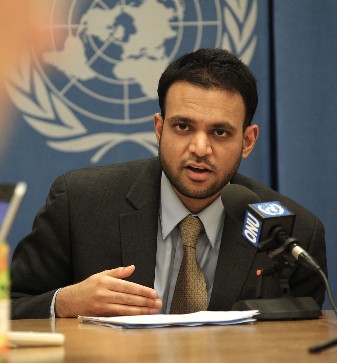 Coordinator of the CSCC, Rashad Hussain. Department of State.
Coordinator of the CSCC, Rashad Hussain. Department of State.
The Social Media War on ISIS
Last Monday marked a year since the declaration of a caliphate in Iraq and Syria by the extremist group Daesh (Islamic State, ISIL, ISIS). Despite maintaining and even expanding their territorial claims over the past year, some argue that their greatest accomplishment is their social media campaign.
Assisting in attracting fighters and spreading their extremist ideology, social media has been a valuable tool for the group to continue to grow and garner support regionally, and internationally.
This year, the Brookings Institute published an analysis paper entitled, The ISIS Twitter Census, which estimated a total of 46,000 Twitter accounts which support the group’s message. Primarily found in the Middle East, the bulk of accounts were located in Iraq, Syria, and Saudi Arabia.
Understanding the role of propaganda in the recruitment and radicalization process, the paper warns that if measures are not taken to limit the spread of the extremist content, the consequences may be enduring.
Efforts by Twitter and the U.S. government to counter and stifle Daesh’s message have been mainly unsuccessful. Tasked with combating Daesh’s online propaganda, the Center for Strategic Counterterrorism Communications (CSCC) has been widely criticized for the makeup of its counter message to radical groups.
When asked about the U.S.’s response strategy to ISIS’s online propaganda in an interview with CBS News, Alberto Fernandez, the center’s former director, stated:
“It’s not that ISIS is so great, it’s that the response against ISIS is both limited and weak.”
He goes on to highlight that the U.S. employs dozens of workers to combat online material, whereas the terrorist group has thousands of supporters online. This asymmetry provide Daesh with a distinct advantage in the volume of content being disseminated.
Efforts to degrade the message of the group, particularly online, must be bolstered. As Secretary of State John Kerry stated in regards to the efforts to delegitimize Daesh:
“Probably far more important than the military in the end is going to be what countries are able to do to help Iraq…to step up an start drying up this pool of Jihadis who get seduced into believing there’s some virtue in crossing into Syria to fight or to join ISIL.”
Last week, Europol, the European police agency, announced it would create a new force to “discover and dismantle” social media accounts linked to the terrorist group. The force will be staffed by 15 officers who will search the internet for the extremist content.
Just as the CSCC, this force will struggle to counter the volume of ISIS media. While shutting down accounts may limit the short-term spread of extremist content, the finding of the Brookings report suggests ISIS’s social media users have multiple accounts, limiting any lasting effect of terminating accounts.
While it is impossible to stop the flow of extremist content and ideology, a concerted, long-term campaign must be initiated by both private and public parties that have the power to effectively combat the social media campaign run by the extremist group.
As President Obama iterated yesterday in a briefing at the Pentagon:
“Ideologies are not defeated with guns, they are defeated by better ideas, a more attractive and compelling vision… The US will continue to do our part by working with partners to counter ISIL’s hateful propaganda, especially online.”
By acknowledging the importance of social media, the administration has taken an integral step in the long-term effort to eradicate the religious extremism promoted by terrorist groups such as Daesh. It must now offer the appropriate tools to communities vulnerable to the recruitment of ISIS to allow them to combat the influence of the extremist group’s message within their communities. This effort must be initiated and maintained by community leaders and members, not by government officials who alienate the credibility of counter-terrorist efforts.






One of my roles in Iraq, until several weeks ago, was to advise and support Iraq justice/security sector decision-makers. One of the serious gaps I discovered was the lack of local social media experts to combat the ever-growing potency and influence of Daesh on Iraqi society to say nothing of the rest of the Middle East. Top Iraqi officials are keenly aware of this weakness but need Western know-how to provide them with the necessary tools and training to be self-sufficient. Such capacity development sadly comes at a snail’s pace. At the rate Daesh is moving, time to react becomes of the essence. In addition to combatting Daesh directly, the administration ought to immediately empower the local governments in Iraq and elsewhere to fight the enemy locally and coordinate the grand strategy for an all out sustainable assault to defeat and destroy its efforts.